

Thèse bossis elodiePH12 (1) PubMed Central, Figure 1: PLoS One. 2009; 4(10): e7396. Published online Oct 9, 2009. doi: 10.1371/journal.pone.0007396. Harvard-MIT Health Sciences and Technology. Monday, August 4, 2014 – 10:30 AMMEEI, Meltzer Auditorium (3rd Floor) Defined populations of progenitor cells show limited and distinct capacity for differentiation into hair cells, neurons, and glia Despite the fact that mammalian hair cells and neurons do not naturally regenerate in vivo, progenitor cells exist within the postnatal inner ear that can be manipulated to generate hair cells and neurons.
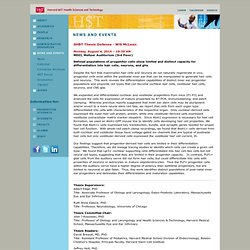
Un nouveau traitement contre l'épilepsie ? A implant that trains your brain to stop tinnitus. Is that ringing in your ears bad enough that you would install a brain implant just to be rid of it?
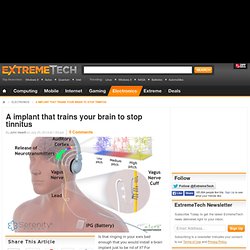
For thousands of Americans, the answer seems to be yes. A series of clinical trials for an implant made by company called MicroTransponder has demonstrated that its new device, which sits by your vagus nerve on your neck, is up to the job. Amusingly enough, though, as with a lot of bleeding-edge neuroscience, the device makers aren’t entirely sure why or how it works. The implant targets the vagus nerve, also known as cranial nerve X. The X indicates that the nerve is the tenth major nerve to exit the brain counting downwards from the cranial base.
One refinement used by MicroTransponder methodology is to pair different kinds of auditory cues with the electrical stimulation to identify the triggers of the tinnitus. Much remains to be understood regarding how tinnitus occurs. For now, vagus nerve implants seem to be the best hope tinnitus suffers might have. Effectiveness of Ginkgo biloba in treating tinnitus: double blind, ... Differential [14C]2-deoxyglucose uptake after deafferentation of the mammalian auditory pathway — a model for examining tinnitus. A Department of Surgery, Secions of Otolaryngology, Yale University School of Medicine, New Haven, Conn. 06510 U.S.A.b Neurosurgery, Yale University School of Medicine, New Haven, Conn. 06510 U.S.A.
![Differential [14C]2-deoxyglucose uptake after deafferentation of the mammalian auditory pathway — a model for examining tinnitus](http://cdn.pearltrees.com/s/pic/th/differential-deafferentation-107696017)
Accepted 3 April 1980, Available online 14 March 2003 Choose an option to locate/access this article: Check if you have access through your login credentials or your institution Check access Get rights and content First page preview Keywords. RA08. Composante somato sensorielle de l'acouphène. Effets moléculaires et cognitifs de la survenue d'acouphènes induits ... Salicylate Induces Tinnitus through Activation of Cochlear NMDA Receptors. Abstract Salicylate, the active component of aspirin, is known to induce tinnitus.
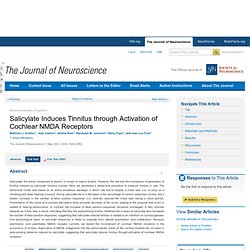
However, the site and the mechanism of generation of tinnitus induced by salicylate remains unclear. Here, we developed a behavioral procedure to measure tinnitus in rats. The behavioral model was based on an active avoidance paradigm in which rats had to display a motor task (i.e., to jump on a climbing pole when hearing a sound). Giving salicylate led to a decrease in the percentage of correct responses (score) and a drastic increase in the number of false positive responses (i.e., animals execute the motor task during a silent period). Introduction Approximately 20 million people in the United States of America experience tinnitus (ringing in the ears), and probably two million of them suffer from tinnitus that interferes substantially with their daily occupation and activities.
Sélection de sites – Thèses. Docteurs et doctorats Ma thèse en 180 secondes : Faire comprendre des années de recherche en trois minutes et au plus grand nombre, telle est l'ambition de ce concours inspiré de Three minute thesis , conçu à l’Université du Queensmand (Australie).
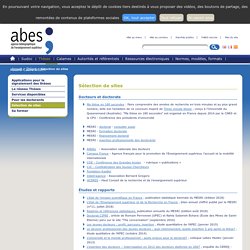
"Ma thèse en 180 secondes" est organisé en France depuis 2014 par le CNRS et la CPU - Conférence des présidents d’université ANDès - Association nationale des docteurs Campus France - Agence français pour la promotion de l'Enseignement supérieur, l'accueil et la mobilité internationale CGE - Conférence des Grandes écoles - rubrique « publications » CJC - Confédération des Jeunes Chercheurs Fondation Kastler Intelli'agence - Association Bernard Gregory HCERES - Haut Conseil de la recherche et de l'enseignement supérieur Études et rapports Rechercher une thèse. Tinnitus: Ringing in the ears and what to do about it. Constant noise in the head rarely indicates a serious health problem, but it sure can be annoying.
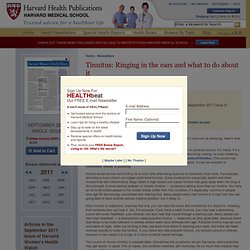
Here’s how to minimize it. Tinnitus (pronounced tih-NITE-us or TIN-ih-tus) is sound in the head with no external source. For many, it’s a ringing sound, while for others, it’s whistling, buzzing, chirping, hissing, humming, roaring, or even shrieking. (To get an idea of what people with tinnitus hear, go to www.ata.org/sounds-of-tinnitus.)
The sound may seem to come from one ear or both, from inside the head, or from a distance. Almost everyone has had tinnitus for a short time after being exposed to extremely loud noise. Most tinnitus is subjective, meaning that only you can hear the noise. The course of chronic tinnitus is unpredictable. While there’s no cure for chronic tinnitus, it often becomes less noticeable and more manageable over time. What’s going on? Most tinnitus is “sensorineural,” meaning that it’s due to hearing loss at the cochlea or cochlear nerve level. Moteur de recherche CNRS. INP Toulouse Theses -